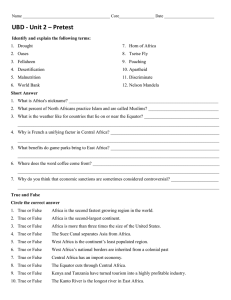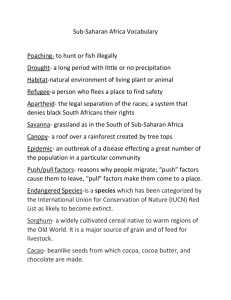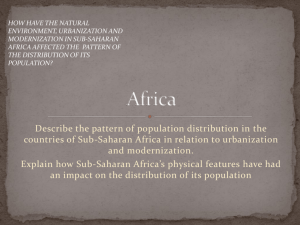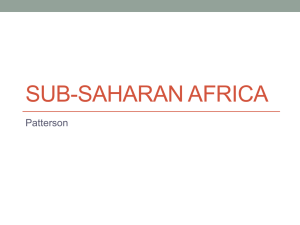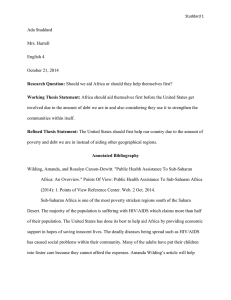PowerPoint Presentation - Northern Highlands Regional HS
advertisement
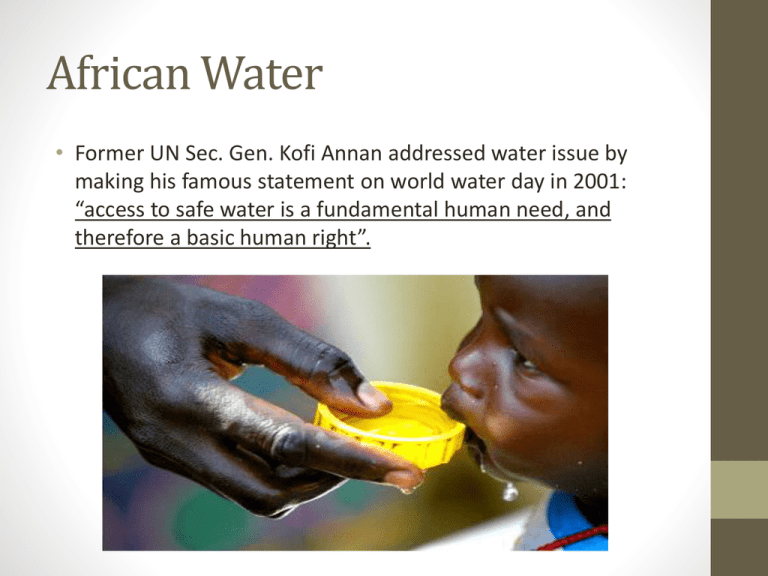
African Water • Former UN Sec. Gen. Kofi Annan addressed water issue by making his famous statement on world water day in 2001: “access to safe water is a fundamental human need, and therefore a basic human right”. Current situation with Water • In a few years from now, almost all sub-Saharan countries will be below the level at which water supply is enough for all. Even worse, most of them will be in a state of water-stress or scarcity. • http://water.org/water-crisis/water-facts/water/ Access to water • The UN tells us that everyday; million of adults (largely women) spend several hours gathering and transporting water for cooking and drinking. Water and disease • Water-related diseases are a growing human tragedy, killing more than 5 million people each year • Water-borne diseases include cholera, typhoid, bacillary dysentery, polio, meningitis, hepatitis A and E and diarrhea, among others. These are diseases caused by dirty water, and most can be prevented by treating water before use. Water Wars • The main conflicts in Africa during the next 25 years could be over that most precious of commodities - water, as countries fight for access to scarce resources. • The combined population of the three countries the Nile runs through - Ethiopia, Sudan and Egypt - rises as predicted from 150 million today to 340 million in 2050 then there could be intense competition for increasingly limited water resources. • http://www.pbs.org/frontlineworld/watch/player.html?pkg=africa705&seg=3&mod=0 Water and Agriculture • In Africa precisely where 25% of the population faces chronic water stress, yet over half of the water used for agriculture never reaches the crops. It’s lost to leakage and evaporation, severely crippling crop yields if not shared with animals. • Most developing countries in the world are not waterdeficient; they are rather infrastructure and or management deficient. Water and Urbanization • Sub-Saharan Africa suffers from chronically overburdened water systems under increasing stress from fast-growing urban areas. Additional obstacles • Weak governments, corruption, mismanagement of resources, poor long-term investment, and a lack of environmental research and urban infrastructure only exacerbate the problem. Need for Infrastructure • Insufficient infrastructure is a major reason • A significant regional disparity in sanitation infrastructure between sub-Saharan Africa and other regions is apparent. Building dams • There are 1270 large dams in sub-Saharan Africa. These new dams will hopefully bring power and irrigation to many communities in need. Many of these dams are being built by the Chinese. Water pollution • The first contributor to water pollution in Africa is the mining organizations and farmers. Many of the mines are polluting the water with their waste. • Poor sewage systems also contribute to the water pollution in Africa. Much of the human waste in Africa is spilling into the water ways. • http://ewn.co.za/2014/01/27/Water-crisis-a-mammoth-problem Water pollution cycle • Polluted water is used to take care of small children and infants. They are going to become ill if they are continually drinking contaminated water. This water is also used to water the crops that are being grown in Africa. That water is polluting the food that is then being consumed by animals and humans living in Africa. Finally, cattle and other livestock are also drinking the water. They are becoming contaminated as well. When they produce milk or they are butchered for meat, they are producing contaminated food that Africans are consuming. Fixing the problem • Rules need to be created and followed by all farmers and mining operations. • Proper sewage disposal needs to be invested in and carried out. • Water filtration needs to be a top priority • Because sub-Saharan Africa is subject to more extreme climate variability than other regions, it needs improved water storage capacity. Some experts say that large dam projects would create a more sustainable reserve of water resources to combat the burden of climate fluctuations. • Better donor emphasis on water development is needed. • Small-scale agricultural improvements also offer a solution to water stress, including the harvest of water in shallow wells, drip irrigation for crops, the use of pumps, and other technological innovations Water in the ground? • http://www.nytimes.com/2013/09/20/opinion/where-wateris-gold.html?ref=water VIDEO • • • • • http://www.irinnews.org/film/?id=4125 http://www.irinnews.org/film/?id=4124 http://www.irinnews.org/film/?id=4103 http://www.irinnews.org/film/?id=4104 http://e360.yale.edu/feature/when_the_water_ends_africas_ climate_conflicts/2331/ • https://www.youtube.com/watch?v=c-fOi0iBUL8 • https://www.youtube.com/watch?v=cRTk7aSbyd0 News • http://www.nytimes.com/2012/06/18/opinion/africas-hiddenwater-wealth.html • http://www.nytimes.com/2012/05/22/world/africa/nigerchildren-miss-school-to-search-forwater.html?pagewanted=all • http://www.nytimes.com/2015/12/27/world/africa/droughtdeepens-south-africas-malaise.html
